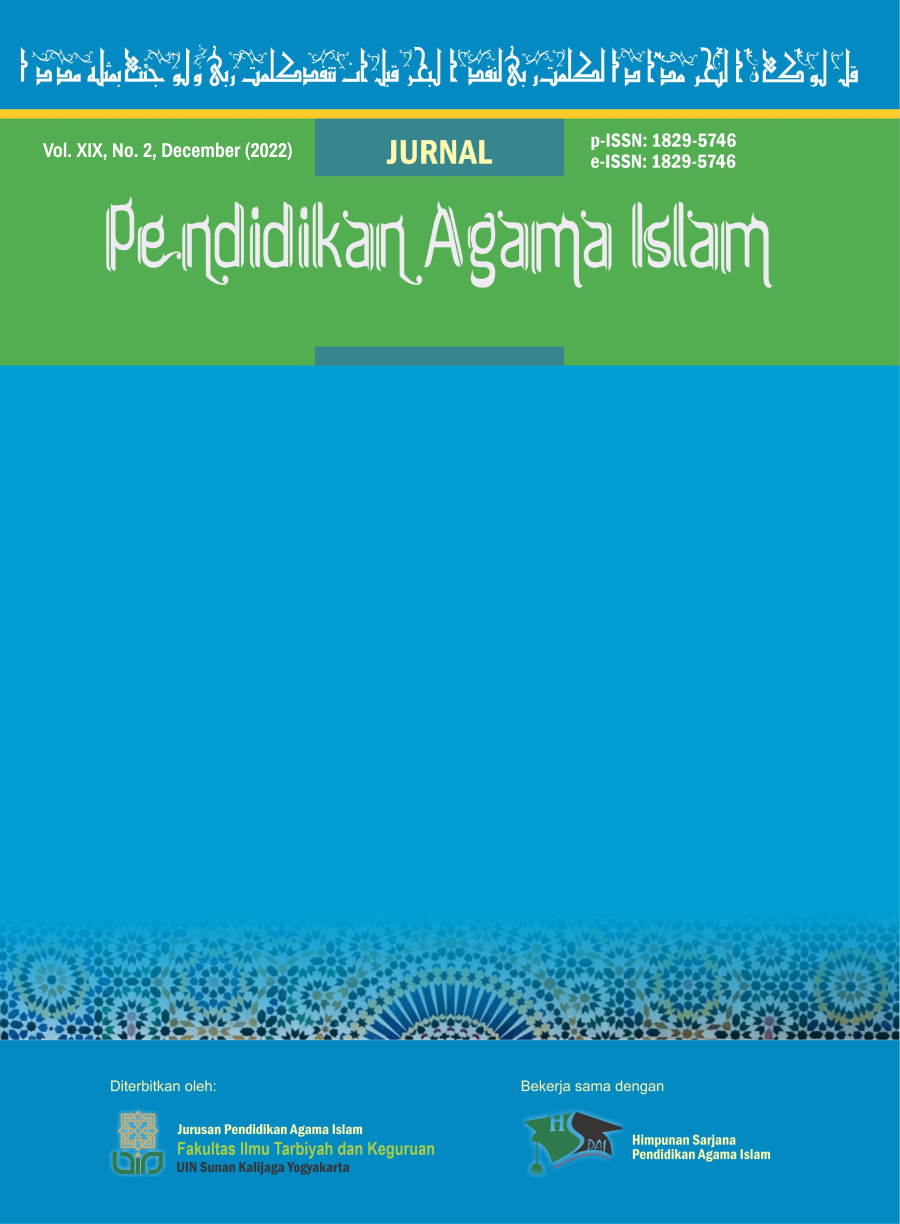A Model of Inclusive Education Curriculum in Islamic Education Institutions: A Case Study in Banten Province, Indonesia
##plugins.themes.bootstrap3.article.main##
Abstract
Purpose – The objective of this study was to describe and analyze the inclusive education curriculum model according to the Decree of the Director General of Education in 2016.
Design/methods/approach – Qualitative descriptive methods in this study were used to describe the use of the inclusive curriculum model thoroughly and empirically in Islamic schools (Madrasah). In-depth interviews, observation, and document studies are used to collect field data using triangulation to conclude.
Findings – Based on the field data results, the development of the curriculum for the four Madrasahs which were the target of research adapted more show duplication by modifying some of its elements/items/components. No fully modified curriculum components were found but only learning strategies or approaches based on the needs and conditions of students with special needs. This has an impact on the potential development of children with special needs who are not yet optimal.
Research implications/limitations – This research was conducted in 4 Madrasah in Banten Province. There are 18 Madrasah in other provinces which have become pilot projects for inclusive education.
Originality/value – The maximum development of a student’s potential can be made possible by various other development models, such as modification, substitution, and omission.
Keywords:
Downloads
##plugins.themes.bootstrap3.article.details##
Copyright

This work is licensed under a Creative Commons Attribution-ShareAlike 4.0 International License.
Copyright Notice
Authors who publish with this journal agree to the following terms:
- Authors retain copyright and grant the journal right of first publication with the work simultaneously licensed under a Creative Commons Attribution License that allows others to share the work with an acknowledgement of the work's authorship and initial publication in this journal.
- Authors are able to enter into separate, additional contractual arrangements for the non-exclusive distribution of the journal's published version of the work (e.g., post it to an institutional repository or publish it in a book), with an acknowledgement of its initial publication in this journal.
- Authors are permitted and encouraged to post their work online (e.g., in institutional repositories or on their website) prior to and during the submission process, as it can lead to productive exchanges, as well as earlier and greater citation of published work.
References
Agustin, I. (2019). Permasalahan dalam Penyelenggaraan Pendidikan Inklusi di SDN Se Kecamatan Soko Kabupaten Tuban, 3 (2). https://doi.org/http://dx.doi.org/10.30651/else.v3i2.3104
Arifin, Z. (2012). Penelitian Pendidikan Metode dan Paradigma Baru. Bandung: PT Remaja Rosdakarya.
Bourke, P. E. (2010). Inclusive education reform in queensland: implications for policy and practice. Taylor & Francis: The International Journal of Inclusive Education, 14(2), 183–193. https://doi.org/https://doi.org/10.1080/13603110802504200
Budiyanto, & Dkk. (2009). Modul Training of Trainer Pendidikan Inklusi. Jakarta: Depdiknas - MCMP.
Elis, L. (2019). Wawancara dengan Evi (Guru PAI MTs Yabika). Jakarta.
Hanum, L. (2014). Pembelajaran PAI Bagi Anak Berkebutuhan Khusus. Jurnal Pendidikan Agama Islam, 11 (2), 217–236. https://doi.org/https://doi.org/10.14421/jpai.2014.112-05
Kustawan. (2016). Bimbingan dan Konseling bagi Anak Berkebutuhan Khusus. Jakarta: Luxima Metro Media.
Mitchell, L. (2010). Pedoman umum Penyelenggaraan Pendidikan Inklusif. Jakarta.
Mudjito, Elfindri, Harizal, & & Riduan, R. (2014). Pendidikan layanan khusus: model-model dan implementasi. Jakarta: Baduose Media.
Munawir, Y. (2011). Implementasi Pendidikan Inklusif melalui Adaptasi Kurikulum dan Pembelajaran. Pgsd. Retrieved from https://pgsd.binus.ac.id/2017/04/10/ pendidikan-inklusi/
Latief. (2009).Pendidikan Inklusi Masih Banyak Kendala baca. Kompas.Com.
Prambadi, G. A. (2021). Kemendikbudristek: Terus Perkuat Peran Sekolah Inklusif. Republikan Online.
Rose, R., Shevlin, M., Winter, E., O’Raw, P., & & Zhao, Y. (2012). Individual education plans in the republic of ireland:an emerging system. Nasen: British Journal Of Special Education, 39 (3), 110–116. https://doi.org/10.1111/j.1467- 8578.2012.00548.x
Saadati, B. A., & Sadli, M. (2019). Implementasi Pendidikan Inklusi Berbasis Pengembangan Diri di Sekolah Alam Jogja Green School. El Midad, 11 (2). https://doi.org/https://doi.org/10.20414/elmidad.v11i2.1898
Sanjaya, W. (2015). Kurikulum dan Pembelajaran. Jakarta: Prenanda media.
Sari, C. N., & Hendriani, W. (2021). Hambatan pendidikan inklusi dan bagaimana mengatasinya: Telaah kritis sistematis dari berbagai negara. Jurnal Ilmiah Psikologi Terapan, 9 (1), 97–116. https://doi.org/https://doi.org/10.22219/jipt.v9i1.14154
Subini, N. (2014). Pengembangan Pendidikan Inklusi Berbasis Potensi. maxima.
Sugiyono. (2009). Metode Penelitian Kuantitaif Kualitatif. Bandung: Alfabeta.
Sukadari. (2019). Model Pendidikan Inklusi Dalam Pembelajaran Anak Berkebutuhan Khusus. Yogjakarta: Kanwa Publisher.
Sumarni. (2019). Pengelolaan Pendidikan Inklusif di Madrasah. EDUKASI: Jurnal Penelitian Pendidikan Agama Dan Keagamaan, 17(02). Retrieved from http://jurnaledukasikemenag.org/index.php/edukasi/article/view/631/pdf_1
Sunardi. (2013). Pendekatan Inklusif Implikasi Managerialnya. Jurnal Rehabilitasi Remidiasi, 13, 114–153.
Tarmansyah. (2013). Penyiapan Tenaga Kependidikan dalam Kerangka Pendidikan InklusifNo Title. Surabaya.
Undang Undang nomor 20 tahun 2003 (2003).
Winartha, I. M. (2006). Metodologi Penelitian Sosial Ekonomi. Yogjakarta: CV. Andi
684
Views
712
Downloads





